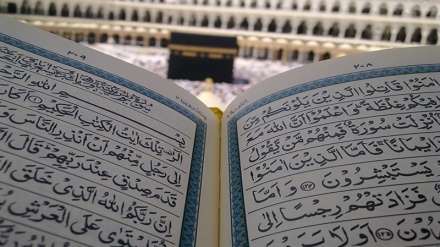Path towards Enlightenment (1012)
Welcome to our latest episode of “Path towards Enlightenment”, which is an endeavour to make you and us familiar with an easy and fluent explanation of God’s Final Scripture to all mankind, the holy Qur’an that was revealed to the Last and Greatest of all Messengers, Prophet Muhammad (blessings of God upon him and his progeny).
As you know, after completing explanation of “Surah Munafiqoun” we have taken explanation of the next Surah, that is, “Surah Taghabun”, which is number 64 in the serial order of compilation of the holy Qur’an.
Revealed in Medina it has 18 Ayahs and takes its name from the word “Youm at-Taghabun” in Ayah 9, which means “the Day of Mutual Loss and Gain” and refers to the Day of Resurrection and Judgement as the Day of Dispossession, since on that day everyone will try to save oneself and put the blame on others. For those who abandon faith and choose to disbelieve they shall lose Paradise and be thrown into Hellfire, cheated forever from felicity by their own souls and their leaders. Those who believe shall gain Paradise against all the attempts of the unbelievers to distract them in the world from faith and goodness, because of their guidance by God and His messengers to steer away from Hellfire. The Surah opens with a description of God’s Majesty, Power, Wisdom, and Knowledge. It reminds the disbelievers of the miserable end of those who disbelieved before them and decisively refutes their denial of the Resurrection. The Surah urges the believers to be wary but forgiving of the enemies they may have within their own families and inspires them to remain steadfast and to spend in God’s cause.
We have already explained Ayahs 1 to 6 of this Surah in our last episode, and today we present you explanation of Ayahs 7 to 12. So let us start with Ayahs 7 and 8, which read:
“The faithless claim that they will not be resurrected. Say, ‘Yes, by my Lord, you will surely be resurrected; then you will be informed of what you did, and that is easy for Allah.’
“So have faith in Allah and His Prophet and the Light which We have sent down, and Allah is well aware of what you do.”
If you might recall, in the previous episode of this programme last month we said the Almighty Creator has power over all and everything, and has granted human beings the freedom to differentiate between right and wrong, which means the consequences of their words and actions rest upon them. We also said that the creation of the universe is not haphazard and unplanned, but rather in accordance with specific aim. This means the Almighty Creator is aware of our secret deeds and hidden intentions and motives, and it is only the proper cognizance of God that inspires us to do good deeds and prevents us from committing sins.
The Ayahs that we recited to you now mean to say that the faithless deny the resurrection and are thus totally unprepared for the Final Judgement. God commands the Prophet to inform them of the certainty of the Day of Resurrection on which all the people will be raised to life to see the report card of their deeds, on the basis of which they will either be rewarded or punished.
As Ayah 8 informs us, we should have firm faith in our Loving Creator and obey whatever has been commanded by the Prophet, who is accompanied with the celestial light for our clear guidance.
These Ayahs teach us that:
- It is lack of faith which makes people deny eventuality of the Day of Resurrection and thus bring eternal damnation upon themselves.
- Every minute deed of ours is recorded by the angels for presentation on the Day of Resurrection to determine reward or punishment.
- It is all within the Infinite Power of the Almighty Creator to raise the dead back to life, even if they had become rotten bones and dust.
- The Ayahs of the Qur’an are light to enable us to come out of darkness and proceed towards the ultimate truth.
Now let us listen to Ayahs 9 and 10 of surah Al-Taghābun:
“The day when He will gather you for the Day of Gathering that will be a day of dispossession (for the disbelievers). And whoever has faith in Allah and acts righteously, shall be absolved of misdeeds and admitted into gardens with streams running in them, to remain therein forever. That is the great success.
“But as for those who are faithless and deny Our signs, - they shall be the inmates of the Fire, to remain in it (forever), and it is an evil destination.”
These Ayahs refer to another feature of the Day of Resurrection which is actually the name of this Surah. It means ‘Taghabun’ or dispossession of the disbelievers when they are raised to life and regret the loss they have incurred upon themselves because of their wicked ways during worldly life. The virtuous who are rewarded with gardens where streams of fresh water flow, will also regret of not having done more good deeds while alive in order to achieve higher rewards when they see the unimaginable bounties of the Hereafter.
Ayah 10 warns the faithless of the punishment for their disbelief and death in the state of sins and agnosticism, saying that they will be cast into the fires of hell which is indeed an evil destination.
These Ayahs teach us the following points:
- While alive we should make the best of the opportunity which God has granted us by doing good deeds and abstaining from evil, so as to avoid the great regret of dispossession on the Day of Judgement.
- Allah the Most Merciful not only rewards the true believers for their virtuous deeds, but also absolves them of the misdeeds they might have committed and sought forgiveness.
- Since the entry into Paradise requires purity and cleansing from the filth of sins, in some cases the erring believers might have to pass temporarily through hell.
- Everyone is in pursuit of success and happiness; but true success and happiness will be gained only through faith in God and doing of righteous deeds.
In conclusion of today’s episode of Path towards Enlightenment, here are Ayahs 11 and 12 of Surah Taghabun:
“No affliction visits (anyone) except by Allah’s leave. Whoever has faith in Allah, He guides his/her heart, and Allah has knowledge of all things.
(So), obey Allah and His Prophet; but if you turn away, then Our Prophet’s duty is only to communicate in clear terms.”
Disasters and problems are part of the worldly life of all human beings, whether believers or disbelievers. This means the faithful ought to be patient in the face of trials and tribulations, since nothing happens except by the Will of God, and those with firm faith will surely be guided by the All-Merciful Creator Who has knowledge of all and everything.
Among the signs of the true believers is their obedience to Almighty Allah through observance of whatever the Prophet has taught and preached. The duty of the prophets is only to convey the message of God to mankind and explain it through clear proofs, rather than forcing people to become Muslims.
From these Ayahs we learn that:
- Faith in God helps us to be firm and steadfast in the face of hardships and calamities, rather than becoming impatient and losing hope in Divine mercy.
- Lofty concepts like patience, trust, satisfaction, and submission to God are factors that guide believers and make them overcome disasters.
- Prophets have the duty of proclaiming Allah’s message in clear terms. They do not impose faith on the people since God has granted free will to the human race with warnings to discern good from evil on the basis of which will be the final reward and punishment.
RM/AS/SS


